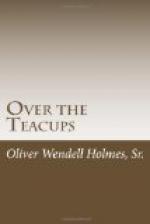I have a picture hanging in my library, a lithograph, of which many of my readers may have seen copies. It represents a gray-haired old book-lover at the top of a long flight of steps. He finds himself in clover, so to speak, among rare old editions, books he has longed to look upon and never seen before, rarities, precious old volumes, incunabula, cradle-books, printed while the art was in its infancy,—its glorious infancy, for it was born a giant. The old bookworm is so intoxicated with the sight and handling of the priceless treasures that he cannot bear to put one of the volumes back after he has taken it from the shelf. So there he stands,—one book open in his hands, a volume under each arm, and one or more between his legs,—loaded with as many as he can possibly hold at the same time.
Now, that is just the way in which the extreme form of book-hunger shows itself in the reader whose appetite has become over-developed. He wants to read so many books that he over-crams himself with the crude materials of knowledge, which become knowledge only when the mental digestion has time to assimilate them. I never can go into that famous “Corner Bookstore” and look over the new books in the row before me, as I enter the door, without seeing half a dozen which I want to read, or at least to know something about. I cannot empty my purse of its contents, and crowd my bookshelves with all those volumes. The titles of many of them interest me. I look into one or two, perhaps. I have sometimes picked up a line or a sentence, in these momentary glances between the uncut leaves of a new book, which I have never forgotten. As a trivial but bona fide example, one day I opened a book on duelling. I remember only these words: “Conservons-la, cette noble institution.” I had never before seen duelling called a noble institution, and I wish I had taken the name of the book. Book-tasting is not necessarily profitless, but it is very stimulating, and makes one hungry for more than he needs for the nourishment of his thinking-marrow. To feed this insatiable hunger, the abstracts, the reviews, do their best. But these, again, have grown so numerous and so crowded with matter that it is hard to find time to master their contents. We are accustomed, therefore, to look for analyses of these periodicals, and at last we have placed before us a formidable-looking monthly, “The Review of Reviews.” After the analyses comes the newspaper notice; and there is still room for the epigram, which sometimes makes short work with all that has gone before on the same subject.
It is just as well to recognize the fact that if one should read day and night, confining himself to his own language, he could not pretend to keep up with the press. He might as well try to race with a locomotive. The first discipline, therefore, is that of despair. If you could stick to your reading day and night for fifty years, what a learned idiot you would become long before the half-century




